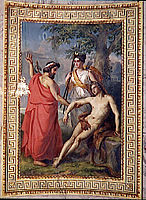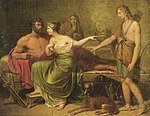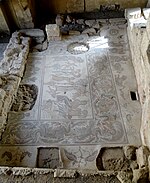Hippolytus of Athens
In Greek mythology, Hippolytus (Greek: Ἱππόλυτος, Hippolytos 'unleasher of horses'; /hɪˈpɒlɪtəs/)[1] is the son of Theseus and either Hippolyta or Antiope. His downfall at the hands of Aphrodite is recounted by the playwright Euripides. Other versions of the story have also survived.
For other uses, see Hippolytus (Greek mythology).Etymology[edit]
The meaning of Hippolytus' name is ironically ambiguous. Ἱππό translates to 'horse', and the element -λυτος (from λύω 'loosen, destroy') suggests the adjective λυτός, -ή, -όν 'which may be undone, destroyed'. His name thereby takes on the prophetic meaning 'destroyed by horses'.[1]
Premise of the myth[edit]
Hippolytus is a hunter and sportsman who is disgusted by sex and marriage. In consequence, he scrupulously worships Artemis, the virgin huntress, and refuses to honor Aphrodite.[2] Offended by this neglect, Aphrodite causes Phaedra, Hippolytus’ stepmother, to fall in love with him;[3] Hippolytus rejects Phaedra's advances, setting events in motion that lead to his death in a fall from his chariot.



